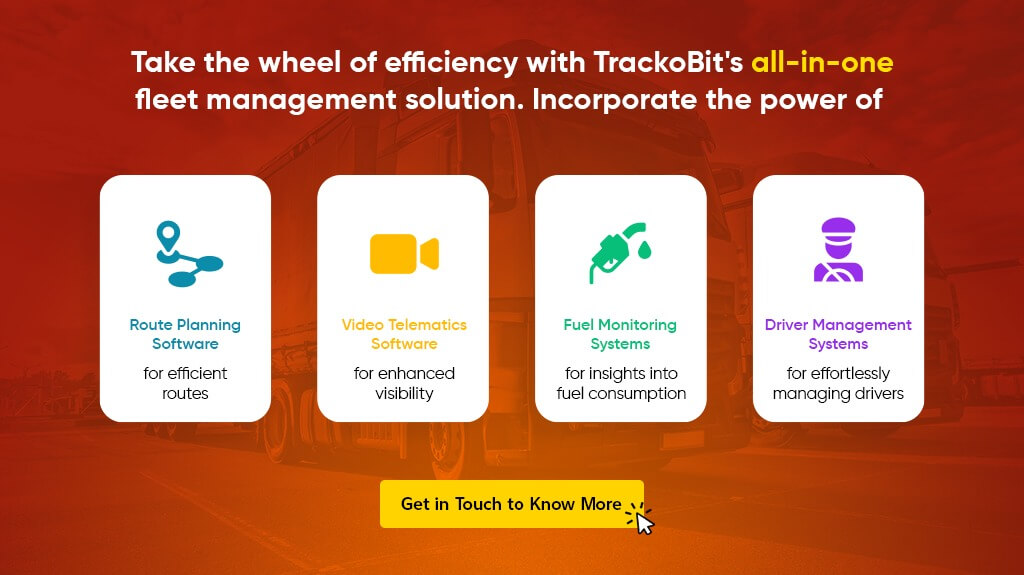-
TrackoBit
Manage commercial vehicles with the new-age Fleet Management Software
TrackoBit -
TrackoField
Streamline your scattered workforce with Field Force Management Software
TrackoField -
Features Resources
-
Blog
Carefully curated articles to update you on industrial trends. -
White Paper
Insightful papers and analysis on essential subject matters. -
Glossary
Explore an alphabetical list of relevant industry terms. -
What’s New
Get TrackoBit & TrackoField monthly updates here. -
Case Study
Explore the cases we solved with our diverse solutions. -
Comparisons
Compare platforms, features, and pricing to find your best fit.
-
About Us
Get to know TrackoBit: our team, ethos, values, and vision. -
Careers
Join the most dynamic cult of coders, creatives and changemakers. -
Tech Support
Learn about our technical support team and services in detail. -
Events
Check out the exhibitions where we left our marks and conquered. -
Contact Us
Connect with us and let us know how we can be of service.
What is Fleet Management in the Logistics Industry- Benefits Unfolded
- Author:Anvesha Pandey
- Read Time:7 min
- Published:
- Last Update: January 7, 2026
Table of Contents
Toggle
Fleet management is crucial in logistics for cost reduction and smooth operations. Read on how you can improve your fleet management process while optimizing routes, reducing excessive fuel usage, and improving delivery efficiency.
Table of Contents
Toggle
When it comes to logistics, we all know that every minute counts. The industry also faces constant challenges like increased expenses, inefficient driver management, and more. For sure the initial leg of a journey can make or break a customer’s experience. In this scenario, an ideal fleet management system becomes the perfect solution to all your problems.
Fast forward to today, where sophisticated software has replaced frantic phone calls. Fleet management has transformed the logistics industry by untangling routes, optimizing operations, and ensuring a smoother, more cost-effective journey for every delivery.
Let’s learn a little more about fleet management: Benefits, Components, and more!
What is Fleet Management in the Logistics Industry
Fleet management in the logistics industry refers to the strategic administration and operation of a company’s fleet to ensure the efficient and effective transportation of goods.
Trusted by over 700+ business owners! (Common)
Go for a free demo to find out why!
It requires a system of technologies that make it easier for the fleet manager to coordinate the activities – right from fuel management to planning the routes – that can be easily managed using fleet management software.
This involves various tasks such as
- Vehicle Acquisition
- Consignment distribution
- Real-time vehicle tracking
- Vehicle maintenance
- Efficient routing
- Driver management
As the demand for fleet management and logistics grows, a proper platform is essential. Obtaining a fleet management system is of utmost importance.
So in this continuation let’s learn why fleet management is important in the logistics industry.
Why is Fleet Management Crucial in Logistics
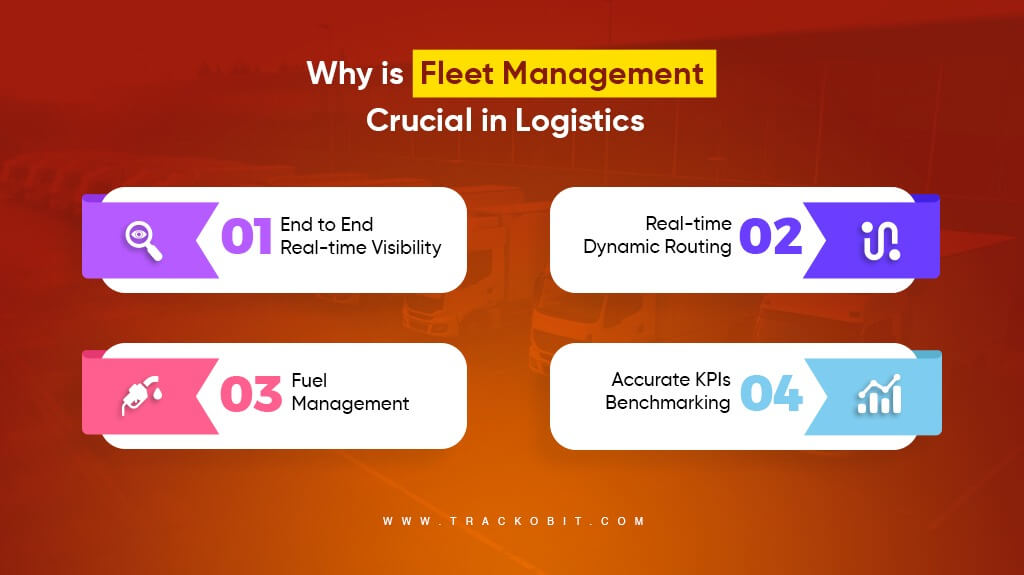
Fleet management is just like the central nervous system of a logistics company. But managing fleets manually can turn out to be one of the worst nightmares. Effective fleet management is important in logistics for ample of reasons, let’s just simply unfold them.
When we think of effective management of fleets, what do we think just knowing the whereabouts of your fleet is enough, obviously not. There are various other factors involved in making fleet management an effective one.
Which brings us to, effective fleet management is not just confined to vehicle tracking. As it also,
- Optimizes Routes
- Minimizes Fuel Consumption
- Maintains Real-time Visibility
All of this translates to significant cost savings. Since transportation is the cornerstone of logistics, well-managed fleets are the backbone of the entire industry.
Together let’s dive a little deeper into the importance of an ideal fleet management system in the logistics industry.
-
End to End Real-time Visibility
End-to-end real-time visibility is the availability of data like locational data, fuel consumption, and more of the supply chain This further enables better decision-making and also improves the overall.
Modern logistics fleet management platforms utilize artificial intelligence and machine learning to support the process of planning, allocating, and tracking fleets with more precision and accuracy. Enhanced visibility on a real-time basis across the fleet operations increases productivity.
-
Real-time Dynamic Routing
Planning the most efficient routes for distribution fleets minimizes distance, time, and fuel costs. Efficient route planning increases the reliability of the business organization in adhering to their timelines and deadlines. Furthermore, it helps with the reduction in extra fuel consumption and helps drivers save time.
-
Fuel Management
Fuel is one of the largest operational expenses of all logistics companies, this makes effective fuel management very essential for cost control. Effective fuel management involves monitoring fuel consumption, implementing fuel-efficient practices, and leveraging technology solutions to track fuel usage. Fleet managers can reduce costs and minimize environmental impact by optimizing fuel consumption.
| Studies show that proper fleet management can reduce fuel costs by up to 20% and improve consignment delivery rates by 15%. |
-
Accurate KPIs Benchmarking
Fleet management key performance indicators (KPIs) are essential metrics for evaluating the performance of a fleet. Fleet monitoring systems provide accurate data about the fleet’s performance that can be used to benchmark performance against set goals, identify areas for improvement, and make informed decisions to optimize operations.
Some of the important KPIs not to miss when it comes to fleet management are
- Vehicle Acquisition and Utilisation
- Route Optimization
- Driver’s Productivity
- Maintenance and Downtime
- Customer Service
Explore more – Top 12 Fleet Management KPIs – Bookmark Before 2026 Ends
Benefits of Fleet Management Systems
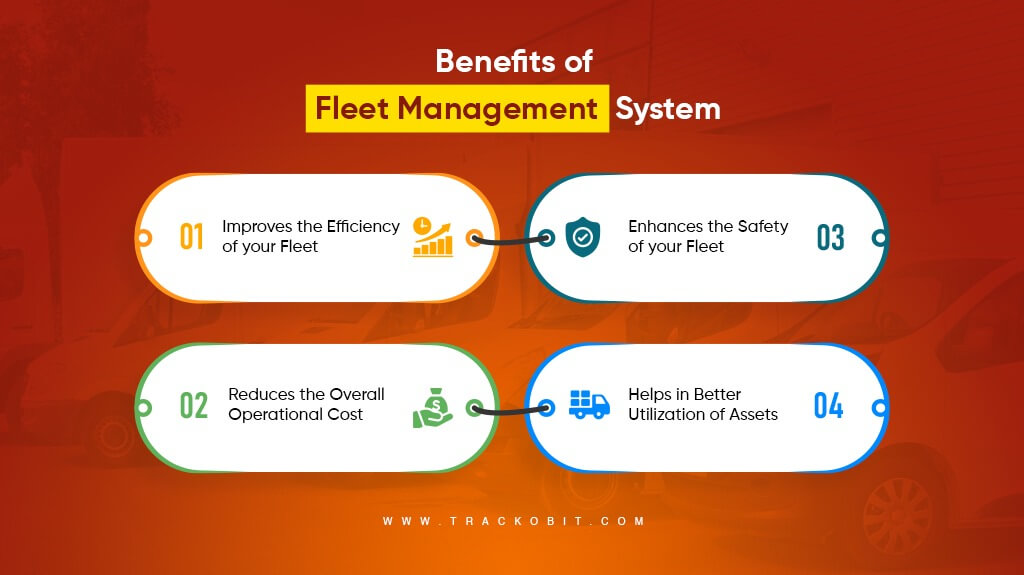
Ideal fleet management systems offer a wide range of benefits to businesses operating in the logistics industry, here’s a breakdown of some of the most crucial benefits of the system.
1) Improves the Efficiency of your Fleet
By providing real-time tracking of vehicles and assets, fleet tracking systems enable businesses to optimize routes, reduce idle time, and improve overall operational efficiency.
2) Saves Cost
With ample features like fuel monitoring, maintenance scheduling, and route optimization, fleet monitoring systems help reduce fuel consumption, maintenance costs, and unnecessary mileage. Furthermore, this also leads to significant cost savings over time.
3) Enhances Safety
Fleet management systems monitor driver behavior, such as speeding and harsh braking. If any such event is detected, the system shoots alerts. By promoting safer driving practices, the system helps reduce the risk of accidents, improve the overall safety of drivers, and also promotes the safety of the assets.
The best part, today’s advanced fleet management software is compatible with anti-theft devices like GPS or asset trackers, e-locks, engine immobilisers – which helps prevent assets from getting robbed or miused.
4) Better Utilization of Assets
By tracking the availability, fleet management systems enable businesses to optimize the utilization of their assets, ensuring that vehicles are used efficiently and not parked idly when they could be generating revenue.
Here’s how TrackoBit is a Partner to Success!
We understand times have changed, as a lot has changed when it comes to the fleet management industry. Here’s where an ideal fleet management system comes into action.
Here’ everything that you get with TB in detail
3) Route Planning Software
Keep all your bad trips aside with an ideal route planning software. Create tours, monitor the routes, and manage trips all hassle-free.
Add to effortless operations with the following features of efficient route-planning software.
- Easy trip assigning and prioritisation
- Real-time trip visibility
- PODs and ETAs sharing
- Prompt route deviation alerts
- Archiving trips
Opt for the most efficient route to reduce downtime, improve the visibility of the assets, and more.
2) Video Telematics Software
We all know video telematics has been one of the greatest technological enhancements in the transportation industry. It has been a powerful tool for enhancing safety, security, and operational efficiency in a fleet. The solution integrates advanced camera technology with telematics data to capture and analyze real-time footage of vehicle operations.
This allows fleet managers to monitor driver behavior, identify risky driving practices, and investigate incidents or accidents. It provides valuable insights into driver performance, adherence to safety protocols, and compliance with regulations.
3) Fuel Monitoring System
Efficient fuel management is crucial for any fleet operation to minimize costs and maximize profitability. A comprehensive fuel monitoring system gives real-time insights into fuel usage, precise fuel reports, instant refill and drainage reports, and mileage reports. By monitoring fuel levels, consumption rates and fuel refiles, businesses perform proactive maintenance and ensure vehicles operate at peak efficiency, ultimately saving money and reducing environmental impact.
4) Driver Behaviour Monitoring System
Needless to say, other than the vehicles, the drivers of your fleet are the most crucial part of your fleet operations. They don’t just drive your vehicles, but your fleet business in general. After all, they are responsible for numerous factors including the consignment reaching the destination on time, vehicles staying safe, healthy engines, total fleet productivity, and more.
The driver behavior monitoring system utilizes telematics data and onboard sensors to track and analyze driver behavior in real-time. This includes monitoring factors such as speeding, harsh acceleration, harsh braking, and harsh cornering.
Final Words
To wrap it all up, embracing robust fleet management software becomes very crucial as it is a strategic imperative for success in the world of logistics.
Fleet management systems provide numerous benefits that help companies streamline their operations, reduce costs, enhance safety, and improve customer service. Altogether this ultimately leads to increased profitability and competitiveness in the logistics industry.
TrackoBit’s comprehensive suite of fleet management solutions empowers businesses to optimize operations, improve safety, and achieve greater efficiency and profitability. From fuel monitoring and video telematics to route planning, driver behavior monitoring, and multi-modal tracking — it encompasses all.
So want to know more!
FAQs
-
What is fleet management in the logistics industry?
Fleet management in the logistics industry involves strategically administering and operating a company’s fleet of vehicles to ensure efficient transportation of goods. It encompasses tasks such as vehicle acquisition and allocation, route planning, real time tracking, adhering to maintenance schedules, and ensuring effective driver management.
-
Why is fleet management important in the logistics industry?
Fleet management is crucial in the logistics industry as it helps optimize routes, minimize fuel consumption, improve safety, and enhance overall operational efficiency. Well-managed fleets serve as the backbone of the logistics industry, ensuring timely deliveries and cost-effective operations.
-
What are the components of fleet monitoring in logistics?
The components of fleet monitoring in logistics include vehicle acquisition, routing, vehicle tracking and telematics, fuel management, and driver behavior monitoring. These components work together to streamline operations and maximize efficiency.
Anvesha is a communication specialist at TrackoBit. With a strong background in media and communications, she adds much-needed balance and brevity to TrackoBit’s... Read More
Related Blogs
-

Why is Driver Drowsiness Detection System Important for Fleet Management?
Shemanti Ghosh February 4, 2026A driver drowsiness detection system is critical for fleet management. It helps prevent fatigue-related accidents and reduces operational risks through…
-
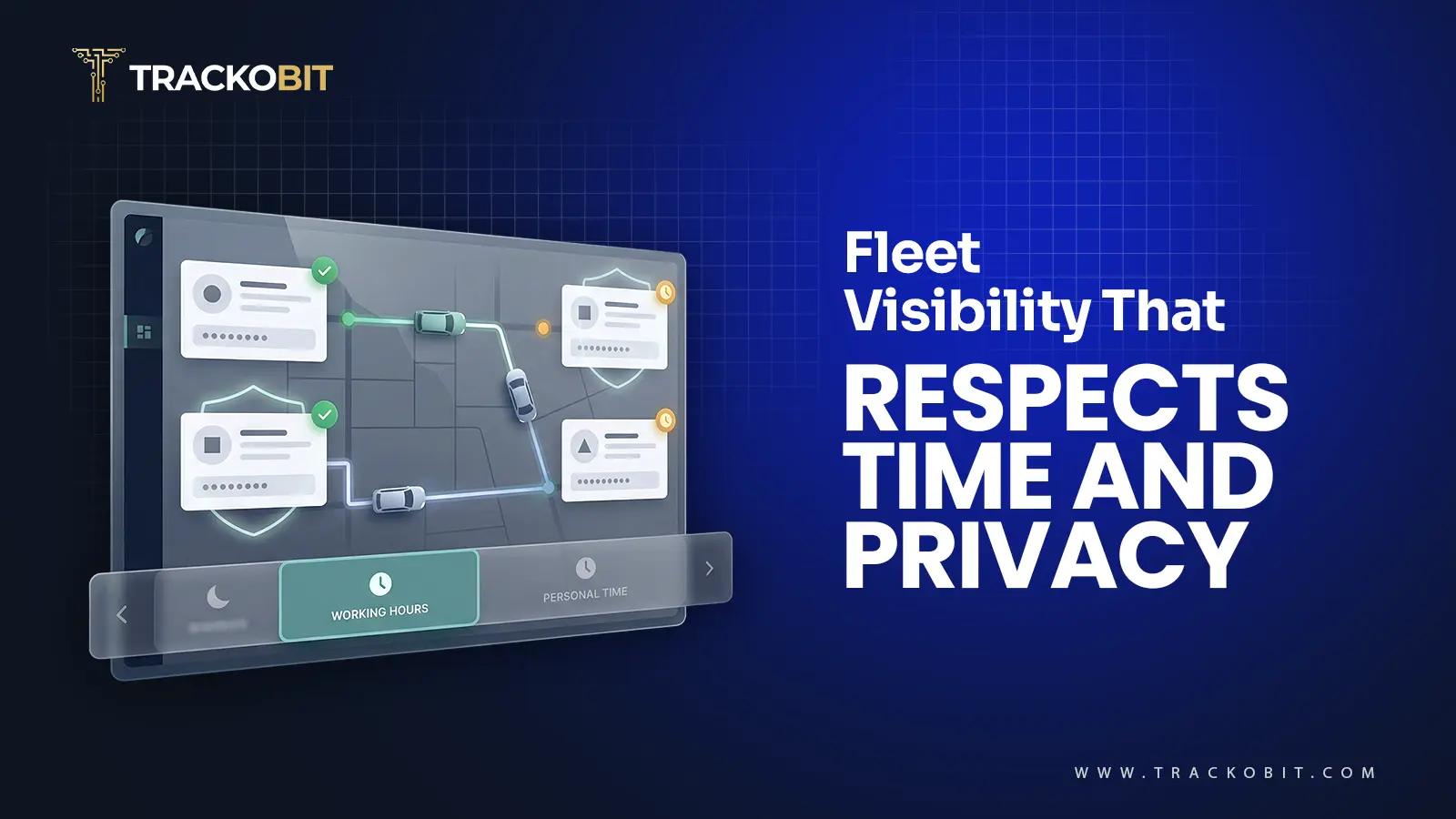
When Tracking Needs a Clock: Rethinking Fleet Visibility
Tithi Agarwal December 24, 2025Read on to understand why fleet tracking works better when it follows working hours. Because visibility should support operations, not…
-

What Makes TrackoBit’s Video Telematics Software Truly Next-Gen?
Shemanti Ghosh December 17, 2025TrackoBit’s video telematics software blends smart video intelligence with full server control. The result? Superior fleet reliability and safety.
-
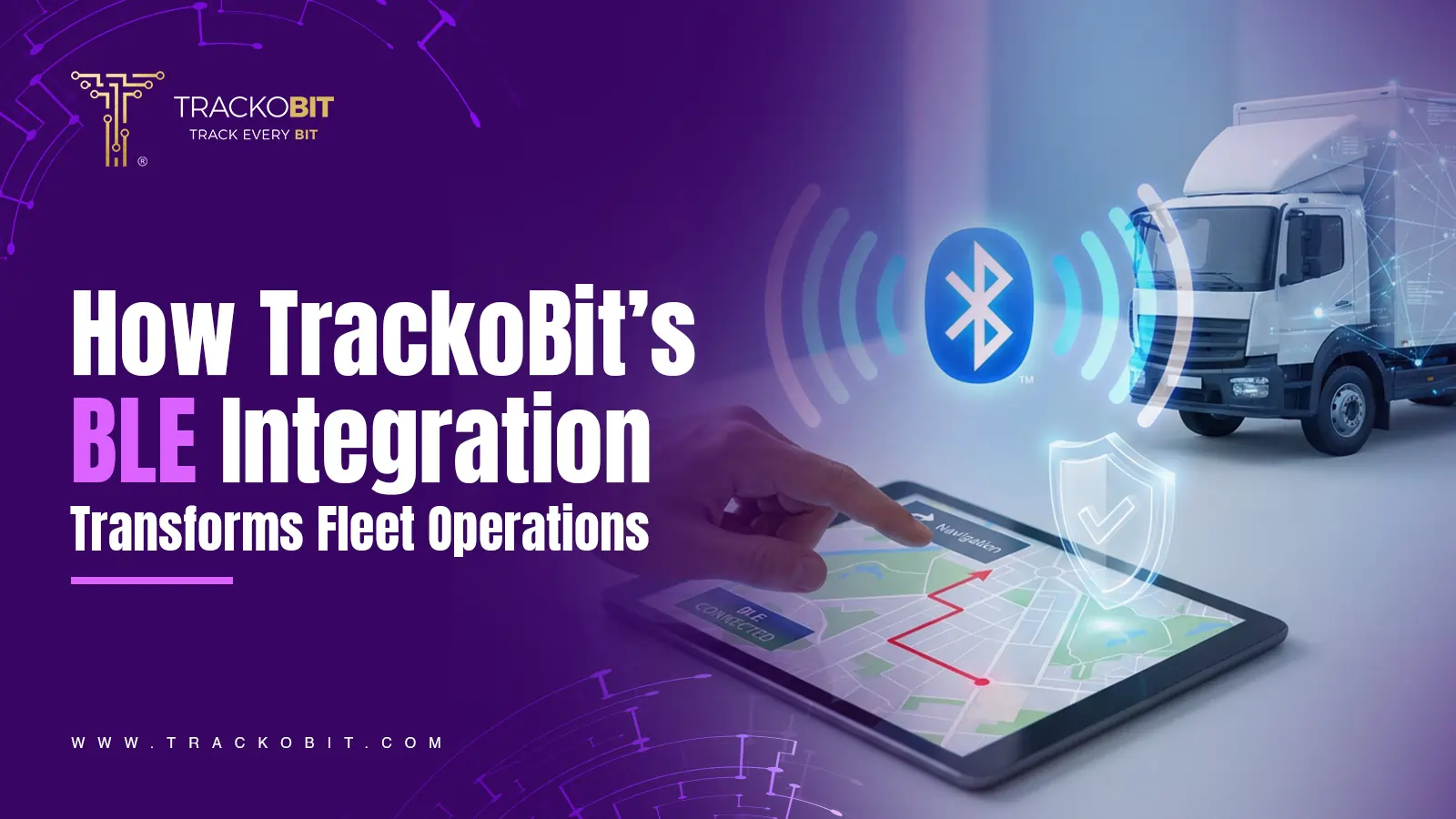
Plug, Pair, Perform TrackoBit Introduces BLE Sensor Integration
Tithi Agarwal November 26, 2025TrackoBit’s BLE Sensor Integration enables wireless, real-time monitoring with faster installs and accurate insights. It improves fleet efficiency, visibility, and…

Subscribe for weekly tips to optimize your fleet’s potential!
Your inbox awaits a welcome email. Stay tuned for the latest blog updates & expert insights.
"While you're here, dive into some more reads or grab quick bites from our social platforms!"Stay Updated on tech, telematics and mobility. Don't miss out on the latest in the industry.
We use cookies to enhance and personalize your browsing experience. By continuing to use our website, you agree to our Privacy Policy.




































